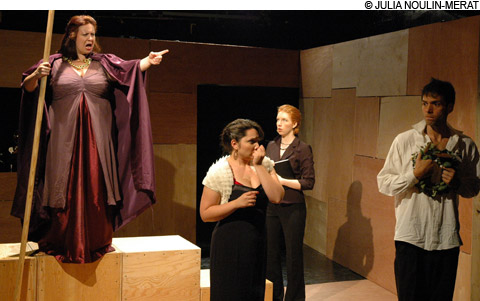
CONFUSING MORALITY PLAY Loose, Wet, Perforated’s confusing dramaturgy doesn’t live up to its fascinating music. |
I want Guerilla Opera to succeed. This feisty little company, performing out of the tiny Zack Box theater at Boston Conservatory, is nothing if not adventurous. They do world premieres with upper-echelon musicians, good singers, and intriguing composers. Guerilla's production of Andy Vores's setting of Sartre's No Exit was the best new opera of 2008. But a year later, Say It Ain't So, Joe, Curtis Hughes's operatic transcription of a Sarah Palin vice-presidential debate, was torture — a potentially clever idea gone totally awry.The latest Guerilla production falls somewhere in between. Australian born, Harvard-educated Nicholas Vines is a compellingly original composer, and his new Loose, Wet, Perforated (through September 25) is full of fascinating music. An eerie prelude and two extended interludes, for clarinets (Rane Moore), saxophones (Kent O'Doherty), trombone (Chris Reade), and percussion (Mike Williams), both grabbed and held my attention with their smooth, slippery seductiveness and surprising but well-timed percussive punctuation. I could never predict what I'd hear next. A suite of this music would make an exciting contribution to a chamber concert.
But just about everything goes wrong whenever anyone starts to sing (not an ideal recipe for an opera). For one thing, most of the words are unintelligible. Vines relentlessly gives just about every monosyllabic word more notes (or should I say "n-uh-uh-uh-otes"?) than they ever need. And though the singers are a little wet and loose about enunciating their consonants ("ordeal" — a key word in the plot — usually comes out "ordee"), and even though the singers are mainly singing a portentous British (that is, not colloquial American) English, the musical settings themselves raise the hurdles to good diction to impossible heights.
But Vines's even bigger failure is one of basic dramaturgy. What must be his own libretto (no librettist is actually credited) is a complicated attempt to make a modern, morally relativistic version of a medieval "morality play," with a narrator telling the story of two allegorical figures, the villainous "Loose" and the innocent "Wet," who have to go through a number of "ordeals" or challenges (by fire and water, for example, like Pamina and Tamino in Mozart's The Magic Flute). But even the written plot summary doesn't help us to understand the object of these challenges. "Why must I climb the greasy pole/To be made whole?" repeats Loose in an extended aria, to which Wet, perhaps like most of the audience, answers: "Huh?" One of the four singers plays a series of different characters, and these transformations are even harder to follow. How can we become interested in these figures if not just their motivations, but also their identities, remain a mystery?
The four-member cast — sopranos Aliana de la Guardia (Loose) and Rebekah Alexander (Perforated), mezzo-soprano Jan Zimmerman (the narrator, I think — she's listed as "Various"), and baritone Jonathan Nussman (Wet) — all have strong voices, though sometimes too strong for this little theater (their diction consistently improves when they're singing more quietly).